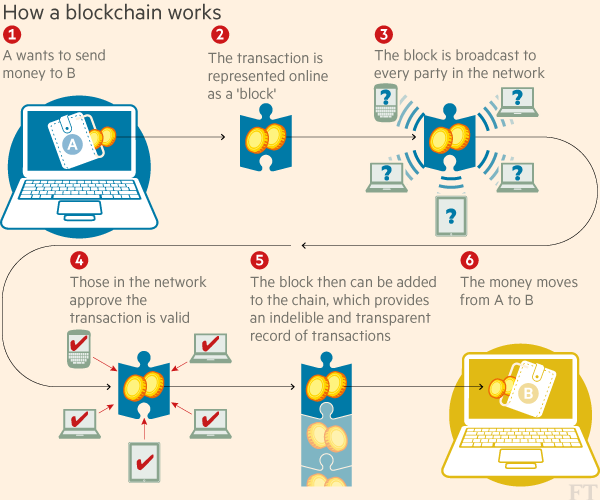(by Rosamond Hutt, weforum.org)
Blockchain was created as the system for running bitcoin and other cryptocurrencies. Big banks and corporate giants are racing to make the technology work for them in the belief that it will cut costs and transform the way the world does business.
Finance is only the start, though. Blockchain is also being put to work on a handful of the world’s toughest problems. Think: human trafficking, conflict diamonds and land rights.
How is this possible? Blockchain is a decentralized database shared among a network of computers, all of which must approve an exchange before it can be recorded. There’s no need for a trusted intermediary like a bank because the information is held securely and transparently on a digital ledger for all users on the network to see.

The implications for society could be huge: blockchain may have been developed as a system for payments, but its admirers believe it has almost endless applications, from making online music sharing fairer to empowering people through registering land.
Here’s a look at a few of blockchain’s more unconventional uses:
Tackling human trafficking
One fifth of the world’s population – an estimated 1.5 billion people – do not have an official document to prove their identity. Most of them live in Asia and Africa and a “disproportionate number” are women and children, the World Bank says.
Without legal identification, these people are “invisible” to society, and that makes them vulnerable to trafficking, prostitution and exploitation.
Microsoft has announced it is working with partners on a secure identity system that uses blockchain to independently verify people’s identities.
Tracking blood diamonds
The Kimberley Process, an international body launched in 2003 to clean up the trade in conflict-zone diamonds, is exploring how blockchain could help trace the provenance of diamonds.

One start-up, Everledger, is already using blockchain to digitally certify diamond ownership. CEO and founder Leanne Kemp believes the technology could also be applied to other problems such as ivory poaching.
“The question of authenticity is key because, for instance, counterfeit goods are funding terrorist activities,” she told WIRED: “We can apply this technology to solve very big problems: ivory poaching, blood diamonds, all these big ‘blood problems’ that are helping cartels, terrorists and criminals.”
The fashion industry is also experimenting with blockchain as a method of tackling counterfeiting.
Shaking up the music industry
Within the music industry, blockchain is being touted as a way to level the playing field for artists by allowing them to sell direct to fans and to solve licensing issues.
Grammy-winning singer-songwriter Imogen Heap released her song Tiny Human using a blockchain platform. Users paid for licences to download, stream and remix the song and each payment was automatically split between all the people involved. Heap has now launched her own blockchain project, Mycelia.






















